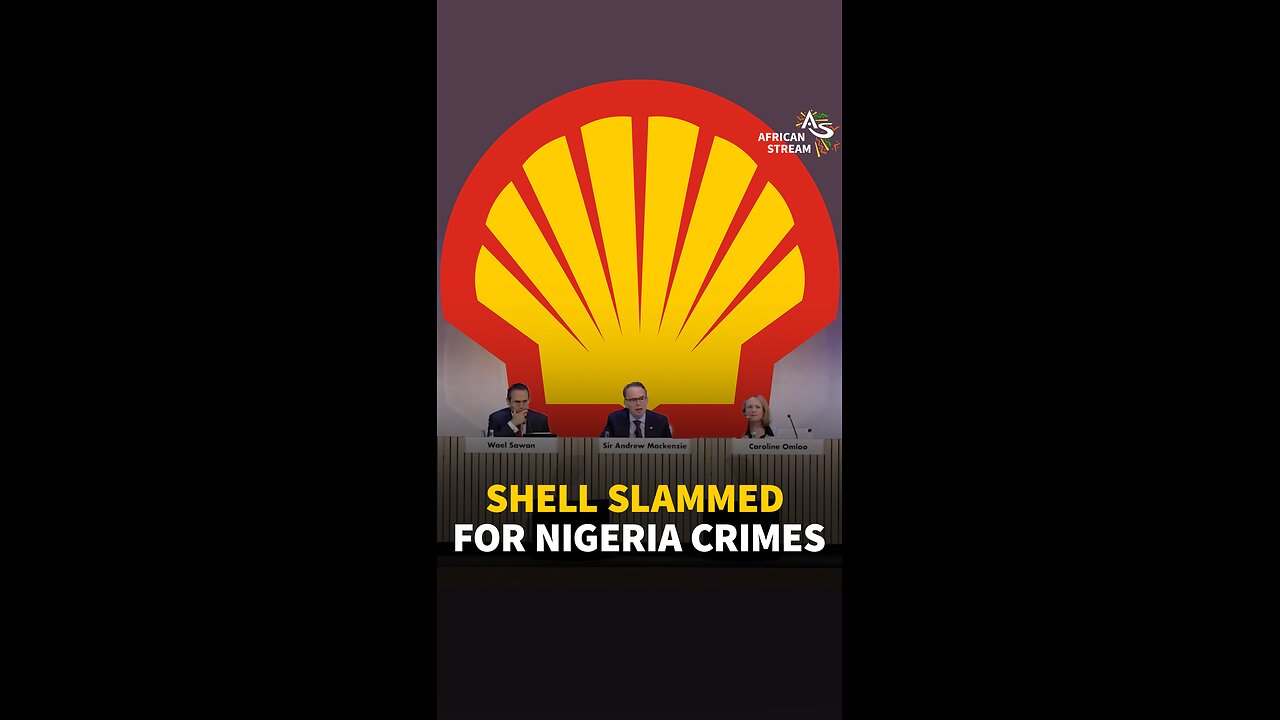Premium Only Content

SHELL SLAMMED FOR NIGERIA CRIMES
When British oil giant Shell held its annual general meeting on 21 May in London, no one expected to hear the controversial story of Nigeria's Niger River Delta until Mikaela Loach intervened.
The Jamaica-born author, climate justice activist and medical student silenced the room with a passionate exposé of Shell's crimes in the delta, where Life expectancy is around 41, 12 years lower than the national average.
Since 1958, Shell's extraction operations have ravaged the densely populated delta's land and waters leading into the Atlantic Ocean. While the delta region only makes up 7.5 per cent of Nigeria's territory, it is home to 45 million people or 20 per cent of 218 million Nigerians.
Shell is also blamed for Nigerian security forces cracking down on protesters in the delta's Ogoniland area, leading to the 1995 hanging of Ken Saro-Wiwa, a writer and activist, and eight other environmental activists, all dubbed the 'Ogoni Nine.'
The National Oil Spill Detection and Response Agency reported oil companies had spilt 19,058 barrels of oil, or the equivalent of around 95 oil tanker trucks, in 2023 alone. Two Swiss researchers calculated in 2019 that nearby oil spills that occur before conception increase newborn mortality by 38.3 deaths per 1,000 live births, an approximately 100 per cent spike.
In 2021, a Dutch court ruled in a case that four Nigerian farmers and environmental group Friends of the Earth (@friends_earth) brought in 2008 suing Shell Petroleum Development Company of Nigeria (SPDC) for Niger River Delta oil spills and Royal Dutch Shell for neglect. Shell agreed to pay $16 million to the farmers and their communities to compensate for damage while the court ordered Royal Dutch Shell to install a leak-detection system.
According to reports, Shell also lost a Nigerian high court case in November that could lead to $44 million in damages.
Meanwhile, the UK Supreme Court unanimously ruled in 2021 that plaintiffs had a 'good arguable case' that Shell was legally responsible for the pollution caused by its Nigerian subsidiary, SPDC, and that the case would proceed.
-
 1:35
1:35
AfricanStream
10 hours agoS. AFRICAN SURGEON WHO CURED DEAFNESS WITH 3D PRINTING
1051 -
 1:42:08
1:42:08
Redacted News
3 hours agoThis is getting out of hand! Dems firebomb GOP headquarters
69.9K124 -
 1:26:10
1:26:10
vivafrei
5 hours agoMarie Le Pen DISQUALIFIED from Elections! It's a GLOBALIST WAR ON POPULISM! & MORE! Viva Frei
97.2K75 -
 26:20
26:20
Nick Shirley
4 hours ago $0.06 earnedInside Ireland’s Dangerous Migrant Crisis
2692 -
 52:55
52:55
Kimberly Guilfoyle
4 hours agoSpecial Investigation: “The Butcher of Pakistan” w/Eric Deters | Ep209
31.2K7 -
 1:01:14
1:01:14
Candace Show Podcast
2 hours agoRFK Jr. & Those Pesky CIA Rumors | Candace Ep 168
58.4K62 -
 13:36
13:36
VSOGunChannel
5 hours ago $0.02 earnedAdmin Losing 2nd Amendment Support FAST
1561 -
 1:00:39
1:00:39
Kyle Fortch
9 hours agoParis Visone: Video Directing For GODSMACK, Touring With Big Time Rush & NKOTB | THE ONE SHEET S1E10
1811 -
 2:13:35
2:13:35
The Quartering
5 hours agoTesla Psycho BEATS Elderly Woman, Wisconsin Supreme Court , USAID Shut Down, Daily Wire FIRINGS
199K66 -
 LIVE
LIVE
Dr Disrespect
7 hours ago🔴LIVE - DR DISRESPECT - PUBG - 5 CHICKEN DINNERS CHALLENGE!
2,263 watching